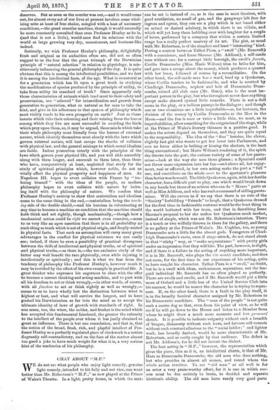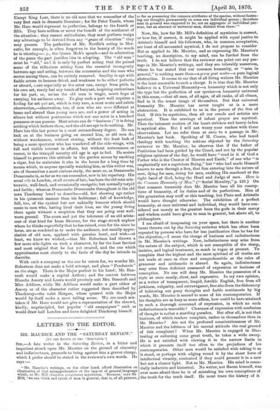CHAT ABOUT " M.P."
WE do not see what people who enjoy light comedy, genuine light comedy, intended to hit folly and not vice, can want better than Mr. Robertson's " M. P.," as now played at the Prince of Wales's Theatre. In a light, pretty house, in which the seats can be sat in instead of on, as is the case in most theatres, with good ventilation, no smell of gas, and the gangways left free for ingress and egress, they can see a play which is not based either on actual or desired adultery, in which there is no villain, and which will yet keep them bubbling over with laughter for a couple of hours, performed by a company that within a certain limited range has a really perfect mastery of its art. The plot, as usual with Mr. Robertson, is of the simplest and least " interesting " kind. During a contest between Talbot Piers, a " swell" (Mr. Bancroft) with a conscience, and Isaac Skoome (Mr. Addison), a self-made man without one, for a corrupt little borough, the swell's fiancée, Cecilia Dunscombe (Miss Marie Wilton) tries to bribe for him, and gets into a scrape about the money, which produces a quarrel with her lover, followed of course by a reconciliation. On the other hand, the self-made man has a ward, bred up a Quakeress, whom Cecilia teaches to be fashionable, and who is courted by Chudleigh Dunscombe, nephew and heir of Dunscombe Duos- cousin, ruined old club man (Mr. Hare), who is the most im- portant person in the play, but who throughout never does anything except make shrewd cynical little remarks. There is not a dull scene in the play, or a tedious passage in the dialogue ; and though one or two situations arc a little improbable—as, for instance, the division of the money by Cecilia Dunscombe as the Man in the Moon—and the fun is once or twice a little thin, we must, as to improbabilities, allow something for the exigencies of the stage, while at the Prince of Wales's literary thinness is a positive good. It makes the actors depend on themselves, and they are quite equal to the responsibility. The idea of the " fine " heroine, the clever, slightly fast girl who wants to get her lover into Parliament, and sees no harm either in bribing or kissing the electors, is the least thing conventional ; but Marie 1Viltou's rendering of it, the spirit she throws into the part, the curious variety of some of her panto- mime—look at the way she uses those glasses ; a Spaniard could not throw more expression into her fan—and above all, her enjoy- ment, real or affected, in her own acting make the part a " full " one, and contribute on the whole more to the spectator's pleasure than better words would. The little Quakeress, again, with her double character, has a difficult part to play, one which would break down in any hands but those of an actress who can do " Mouse " parts as well as Miss Addison, and who has such a command of sidling panto- mime. Will she excuse us if we say that there is no rule of the "Society" forbidding "Friends" to laugh, that a Quakeress dressed for the first time in fashionable costume would be the least thing in the world bothered with her train, and that in describing Isaac Skoome's proposal to her she makes her Quakeress mock modest, instead of simple, which was not Mr. Robertson's intention. There is a touch or two wilfully thrown in there for the gallery, and there is no gallery at the Prince of Wales's. Mr. Cogblan, too, as young Dunscombe acts a little for the absent gods. Youngsters of Chud- leigh Dunscombe's caste, even if stage-struck, do not stand about in that " sticky " way, or " make acquaintance " with pretty girls under an impression that they will bite. The part, however, is slight, and if there is a failure in the acting of anything more important, it is in Mr. Bancroft, who plays the tete montee candidate, and does not seem, for the first time in our experience of his acting, quite to have caught his character. Talbot Piers is a "swell," no doubt, but he is a swell with ideas, enthusiasms, aspirations, not the lan- guid individual Mr. Bancroft has so often played so perfectly. There are swells and swells, and if Mr. Bancroft would put a little more of Oxford and a little less of the United Service Club into his manner, he would be nearer the character he is trying to repre- sent. If, on the other hand, there is a fault in the play itself, it is in the broadly farcical character assigned by Mr. Robertson to his Democratic candidate. The " man of the people " is not quite such a coarse dog as that, even from his point of view, as ho will see if he will go down to the House and listen to a Member from whom he might draw a much more accurate and less prononce sketch. It is possible to indicate vulgarity without such a breadth of brogue, dishonesty without such leers, and fatuous self-conceit without such constant allusions to the " social ladder;" and lighter work, less broadly daubed, would be more characteristic of Mr. Robertson, and as easily caught by that audience. The defect is not Mr. Addison's, for he did not invent the dialect.
The best acting in " M.P.," however, the representation which gives the piece, thin as it is, an intellectual charm, is that of Mr. Hare as Dunscombe Dunscombe, the old man who does nothing, but who presides in almost all scenes, and round whom the whole action revolves. To act " old man " at all well is for an actor a very praiseworthy effort, for it is one in which suc- cess must be due entirely to brain, to decided and separate histrionic ability. The old men have rarely very good parts Except King Lear, there is no old man that we remember of the very first rank in dramatic literature ; for Sir Peter Teazle, whom Mr. Hare would represent to perfection, belongs to the fourth or fifth. They have seldom or never the benefit of the sentiment of the situation ; they cannot attitudinize, they must perforce resign any advantage to be derived from any "grace of elocution" they may possess. The perfection of Mr. Neville's acting in Mer- cutio, for example, is often forgotten in the beauty of the words he is uttering—e. 9., the Queen Mab's speech—and in admiration of the poses the part justifies him in adopting. The "old man" must be "old," an I it is only by perfect acting that the pained sense of the ridiculous arising from the essential incongruity between age and acting, between the accessories and the man who moves among them, can be entirely removed. Senility is apt with feeble actors to become drivel, and weakness to be either pathetic or absurd, more especially as the actor can, except from pride in his own art, rarely feel any touch of buoyant, inspiring enthusiasm for his part, or, unless the old man is tragic, much hope of carrying his audience away. To play such a part well requires a feeling for art qua art, which is very rare, a most acute and subtle observation,—observation, too, of men who are more different at home and abroad than young men are, and a power of acting in silence but without pantomime which not one actor in a hundred possesses or can possess. Most actors can do " business ;" it is doing nothing which bothers them, and the old are apt to do nothing. Mr. Hare has this last power in a most extraordinary degree. IIe can look on at the business going on around him, as old men do, without woodenness, without staring, without the least look of being a mere spectator who has wandered off the side-wings, with full and visible interest in affairs, but without nervousness or unrest, in the tranquil security old age is apt to feel. He assists himself to preserve this attitude in the garden scenes by smoking a cigar, but he maintains it also in the house for a long time by means which, to anyone specially watching him, as this writer was, are of themselves a most curious study, the more so, as Dunscombe Dunscombe is, as far as we can remember, new in his repertory. His usual role in London, at all events of late, has been the old man aris- tocratic, well-bred, and occasionally energetic, but normally torpid and feeble; whereas Dunscombe Dunscombe throughout is the old man Thackeray loved to describe—old, but showing age rather in his quiescent manner than his feebleness ; full of knowledge, full, too, of the cynical but not unkindly humour which should come to men who, having lived their lives, see the young living them again without a suspicion that they are going over well- worn ground. The scorn and yet the tolerance of an old aristo- crat of that kind for Isaac Skootne, for the stage-struck nephew whom he thinks regretfully that he has ruined, even for the niece he loves, are so rendered as to make the audience, not usually appre- ciative of old men, applaud with genuine heart, and wish—at least, we know we wished,—that Mr. Robertson had thrown a few more side-lights on such a character, by far the least farcical and most original that he has yet created, and the one which approximates most closely to the facts of the day he intends to describe.
With such a company as the one he caters for, we wonder Mr. Robertson does not make a bold attempt, and place "Pendennis" on the stage. There is the Major perfect to his hand ; Mr. Ban- croft would make a capital Arthur ; and the contest between Blanche Amory and Laura would precisely suit Mrs. Bancroft and Miss Addison, while Mr. Addison would make a part either of Amory or of the character rather suggested than described by Thackeray—the valet Morgan, whose quarrel with the Major would by itself make a most telling scene. We are much mis- taken if Mr. Hare would not give a representation of the shrewd, kindly, unprincipled, but popular " old campaigner" such as would draw half London and have delighted Thackeray himself.



































 Previous page
Previous page